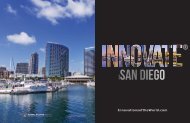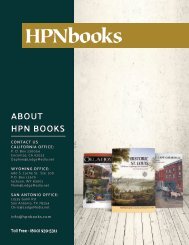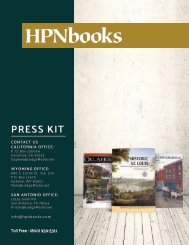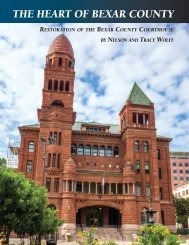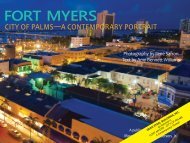In The Cradle of Industry and Liberty
An illustrated history of Philadelphia's manufacturing sector paired with the histories of local companies that make the city great.
An illustrated history of Philadelphia's manufacturing sector paired with the histories of local companies that make the city great.
You also want an ePaper? Increase the reach of your titles
YUMPU automatically turns print PDFs into web optimized ePapers that Google loves.
seen. <strong>The</strong> episode brought Hagner considerable<br />
notoriety <strong>and</strong> thereafter he focused on the<br />
emerging drug milling business. <strong>In</strong> 1820<br />
Hagner moved to Manayunk <strong>and</strong> became one<br />
<strong>of</strong> the early leaders in the industrialization <strong>of</strong><br />
that town, <strong>and</strong> in 1839 he moved to Northern<br />
Liberties where he established a large steampowered<br />
drug mill.<br />
Philadelphia also had two <strong>of</strong> the nation’s<br />
largest quinine manufacturing firms in this<br />
period: Powers & Weightman, founded in<br />
1818, with facilities at both Ninth <strong>and</strong> Parrish<br />
<strong>and</strong> Falls <strong>of</strong> Schuylkill, <strong>and</strong> Rosengarten &<br />
Sons, founded in 1822 <strong>and</strong> located in various<br />
sections <strong>of</strong> the city prior to building a major<br />
facility at Seventeenth <strong>and</strong> Fitzwater Streets in<br />
South Philadelphia. Both <strong>of</strong> these companies,<br />
calling themselves “manufacturing chemists,”<br />
became large <strong>and</strong> prosperous making a variety<br />
<strong>of</strong> medicines <strong>and</strong> chemicals. <strong>The</strong>y would merge<br />
in 1905.<br />
By 1860 some thirty-five percent <strong>of</strong> the<br />
total value <strong>of</strong> the medicines, drugs, <strong>and</strong><br />
extracts produced in the United States was<br />
made by forty Philadelphia firms. Two companies<br />
that would later become major drug<br />
manufacturers—Smith, Kline, & French <strong>and</strong><br />
Wyeth Laboratories—started as pharmacies<br />
in downtown Philadelphia in the years prior<br />
to the Civil War. Smith, Kline, & French was<br />
established by John Smith on North Second<br />
Street in 1830, while Wyeth Laboratories was<br />
founded by brothers John <strong>and</strong> Frank Wyeth at<br />
1410 Walnut Street in 1860. <strong>In</strong> 1870 a Wyeth<br />
employee named Henry Bower invented a<br />
rotary compressed tablet machine that greatly<br />
facilitated mass production <strong>of</strong> medicine<br />
tablets <strong>and</strong> propelled the company into a<br />
major manufacturing role. Both companies<br />
still have a major presence in the Philadelphia<br />
area: Smith, Kline, & French is now part<br />
<strong>of</strong> the multinational pharmaceutical firm<br />
GlaxoSmithKline, whose U.S. headquarters<br />
is at the Navy Yard in South Philadelphia, <strong>and</strong><br />
Wyeth Laboratories is located just outside<br />
the city in Collegeville, Pennsylvania.<br />
BEER<br />
Beer making was yet another industry<br />
in which Philadelphia continued to excel.<br />
<strong>The</strong> U.S. Commissioner <strong>of</strong> <strong>In</strong>ternal Revenue<br />
reported in 1793 that Philadelphia was<br />
shipping more beer than all other American<br />
seaports combined. Lager beer was especially<br />
popular with Philadelphia’s large <strong>and</strong> growing<br />
German population in the mid-nineteenth<br />
century. Bavarian immigrant John Wagner<br />
reportedly made the first lager beer in<br />
America in the 1840s in a small brewery<br />
on American Street near Poplar Street in<br />
Northern Liberties. <strong>The</strong> Engel & Wolf brewery,<br />
which started in Northern Liberties in<br />
the 1840s <strong>and</strong> moved in 1859 to a large<br />
new brewing complex on the Schuylkill River<br />
known as Fountain Green, was one <strong>of</strong> the<br />
@<br />
Left: A c. 1855 view <strong>of</strong> Engel & Wolf’s<br />
Brewery & Vaults at Fountain Green on the<br />
Schuylkill River. One <strong>of</strong> the nation’s first<br />
large-scale brewers <strong>of</strong> lager, Engel & Wolf’s<br />
was one <strong>of</strong> the industries that was acquired<br />
<strong>and</strong> demolished by the Fairmount Park<br />
Commission in the 1870s in an effort to<br />
protect the city’s water supply.<br />
PRINT DEPARTMENT, LIBRARY COMPANY<br />
OF PHILADELPHIA.<br />
Right: Hagner’s Drug Mills in Northern<br />
Liberties, c. 1875. Hagner operated what<br />
is considered the first drug mill in the<br />
United States in the 1810s at the Falls <strong>of</strong><br />
Schuylkill. He moved to Manayunk in 1820<br />
<strong>and</strong> then established this drug mill in<br />
Northern Liberties in 1839.<br />
SOCIETY PRINT COLLECTION, HISTORICAL SOCIETY<br />
OF PENNSYLVANIA.<br />
CHAPTER THREE<br />
55




